Impressions of Nuku Hiva
A town of twenty five hundred souls, Taiohae is the administrative capital of the Marquesas islands, one of five island groups in French Polynesia. The island of Nuku Hiva seems exceptionally peaceful and crime-free. Perhaps 250 people are employed either in government administration or in the small hospital. The rest are farmers, ranchers, fishermen, shopkeepers, stationery engineers, volunteer ambulance medics, etc. Some claim petty theft occurs but no one I know has been a victim.
Eighty miles away in Hiva Oa there is a Navy base, otherwise, the nearest military outpost is seven hundred miles away in Papeete. For law enforcement, we have four gendarmes supported by a clerk and a secretary in their small station on the outskirts of town. In addition, there are a few Municipal Police. They direct traffic when needed and nip at the edges of the small-time trade in cannibis.
Our school kids are preparing for the biggest inter-mural athletic event of the year. Four times per week they launch their pirogues through the surf and paddle their hearts out training for nation-wide competition to be held next month. The one, three or six man craft are slim, colorful and fast. It is both inspiring and entertaining to see the grimace of determined effort on the face of each child as he or she paddles past.
At infrequent intervals, the elementary school schedules a field day for a special event like swimming and football. An odd combination? Not really if football is played on the beach at low tide.
The one road out of town climbs four steep miles to a loop with access to the airport and four smaller villages that dot the shores of this decidedly mountainous island. Some claim the road circles the island, but those who have seen it know the "circle" really consists of a horseshoe with the open ends connected by a goat trail which may be passable in a stout four wheel drive vehicle in good weather.
Four times a week a squad of ten very fit looking men in boots and uniform black shorts and t-shirts may be seen jogging down this road, making a quick loop through town, then jogging back up the four miles of steep climb to the forested plateau. What is that all about?
Every three weeks a supply ship, the Aranui arrives bringing food, building supplies, fuel, vehicles, small boats and tourists. Of course, it also picks up the modest exports of dried coconut meat, vanilla, crafts and fruit juice. Nearly everyone's routine is changed in some way on "Aranui Days" but that is nothing compared to the eight times per year when a cruise ship comes to call. These are usually on round-the-world trips carrying fewer than a thousand guests. The tourist bureau puts on a special program with music and dancing. In what is probably a unique treatment, two dozen pre qualified private vehicles show up to take some of the guests on customized tours showing off the island's rugged cliffs, surf-lapped beaches, coconut groves and quaint villages. This lasts up to two days, then we revert to our relaxed daily routines.


































